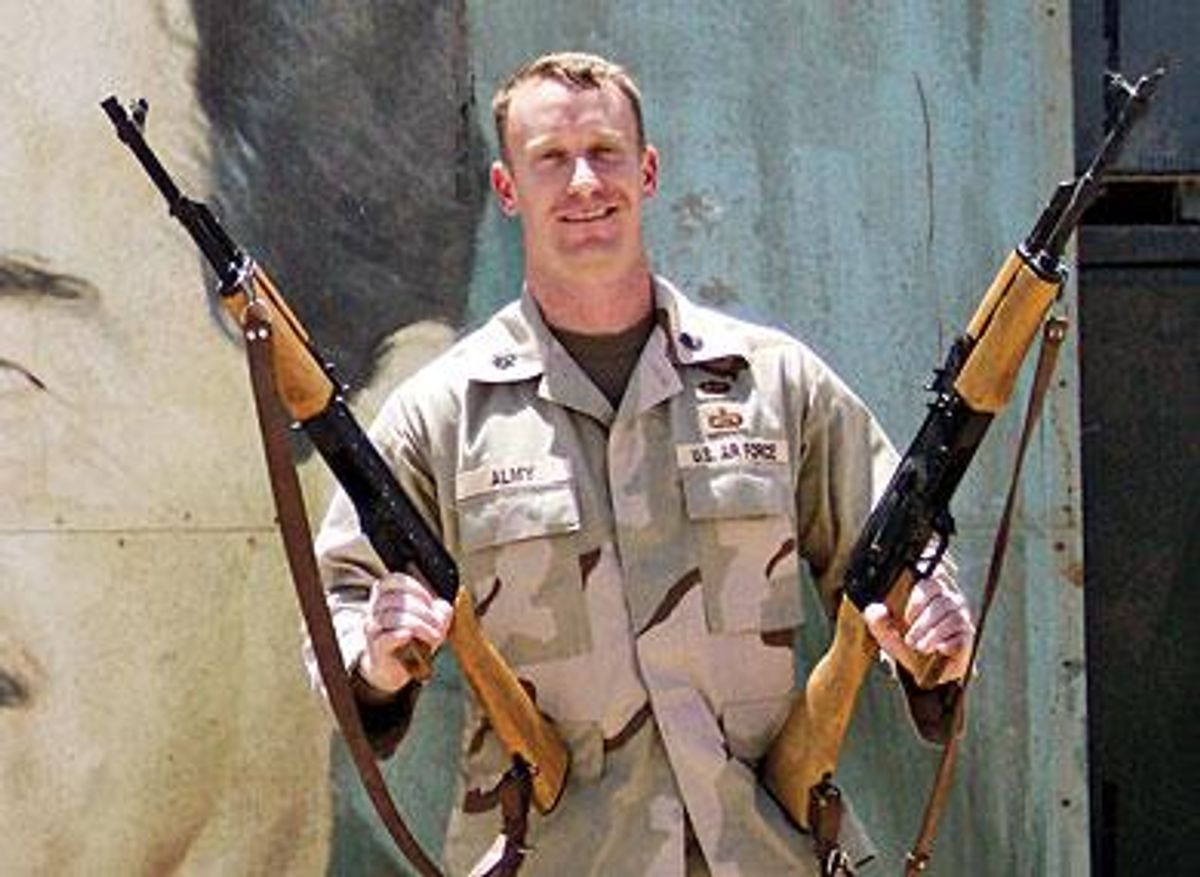Why would Maj. Mike Almy want to return to military life after police escorted him off Spangdahlem Air Base in Germany following his 2006 discharge under "don't ask, don't tell?"
His reasons, like those of many gay soldiers who have suffered similar predicaments, are a mix of the obvious and the intangible. A plainspoken Ohio native and Iraq war veteran whose private e-mails were searched, leading to 16 months of discharge proceedings, Almy served 13 years in the military. That's seven years shy of a retirement that would have provided him an estimated $1.5 million in pension and benefits.
Less quantifiable than the benefits, Almy's sense of purpose has been harder to find in the bottom line-driven world of the private sector as a military contractor. "The motivation is not the same," he says. "There's a sense of sacrifice and fulfillment when you're working for your country in the military. I miss the people, the camaraderie. And the mission."
At press time, repealing "don't ask, don't tell" is not a done deal. And you won't read any celebratory headlines regarding its demise in any issue of this magazine this year. Movement in Congress in recent months has repeal advocates "cautiously optimistic." But critical steps, from the completion of a Pentagon working group study to an executive order calling for a nondiscrimination clause that firmly protects openly gay service members, have yet to be taken.
And critically, the policy is not all that matters. "You'll still have rampant homophobia," says Aaron Belkin, director of the Palm Center, a think tank on sexual orientation and military policy. "While it's symbolically important to erase the stain of second-class citizenship with a nondiscrimination policy, it's not the same as changing the culture."
That hasn't stopped Almy, 40, from seriously contemplating a
return to active duty. Nor has it kept Servicemembers Legal Defense Network, the legal group Almy depended on during his discharge, from planning its future course in a post-repeal world. SLDN expects that 10% to 20% of soldiers discharged under DADT--a full 1,350 to 2,700 troops--will seek to reenlist when the policy is repealed.
Started in 1993 as a legal aid service primarily for gay soldiers who lacked the funds to muster their own defense in DADT cases, SLDN also has become a formidable political lobby to end the ban. The group's executive director, Aubrey Sarvis, doesn't think the need for organizations like SLDN will disappear if repeal happens.
"Like any major federal statute that goes off the books, there will be a period of oversight to ensure that open service becomes a reality," he says. "And the truth is that [openly gay service members] will not have full equality."
Part of the disparity is a result of the Defense of Marriage Act, the 1996 law that prohibits federal recognition of same-sex couples. Like same-sex partners of other federal government employees, partners of gay and lesbian soldiers serving openly would be denied many of the same benefits afforded to spouses of heterosexual colleagues--namely health care--just as they are now.
Sarvis also sees his organization playing a watchdog role similar to the one civil rights groups historically adopted as racially discriminatory laws were struck down decades ago. "There are people within the Pentagon who will resist and will try to put up roadblocks," he says. "Our job, post-repeal, is to knock down that resistance."
Alex Nicholson, executive director of Servicemembers United, another advocacy group in the DADT repeal movement, says he plans to stay in his position--at least until he sees an end to the policy. His goal is to build a "strong, vibrant, connected, and cohesive" working environment for gay service members--one in which he would consider actively participating.
Discharged in 2002, Nicholson, a former Army human intelligence collector, says he would likely go to law school and return to the military in the Judge Advocate General's Corps. Nicholson never set out to become an activist and doesn't see a future for himself in the behind-the-scenes deal making of Washington, D.C.'s gay rights establishment--one that has left him exasperated.
"Sausage making is always a nasty process, but there is really no excuse for the fraud, self-promotion, exploitation, sheer incompetence, and unethical behavior that I've seen in this factory," he says. "In the military there's such a strong sense of ethics, integrity, and honor that you just don't see in many other processes and institutions elsewhere. I can't wait to be a part of it again."
Reenlisting has its uncertainties--and disappointments. How does one repair damage to a career hijacked under DADT? Almy, for instance, is now four years behind his peers in terms of rank, and he would have likely been promoted to lieutenant colonel had he not been discharged.
"Returning would have its ups and downs," he says. "I will certainly have a lot of attention on me without even opening my mouth. But I hope I can be a positive example of a good officer thrown out under a horrible law."


